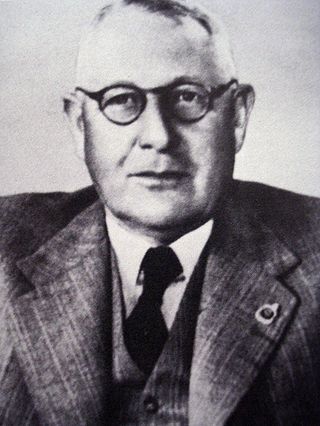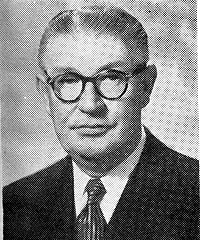Related Research Articles
Melbourne Water is a Victorian Government-owned statutory authority that controls and manages much of the water bodies and supplies in metropolitan Melbourne, Victoria, Australia, including the reservoirs, lakes, wetlands, canals and urban creeks, and the sewerage and drainage systems that services the city.

Francis Ford was an American film actor, writer and director. He was the mentor and elder brother of film director John Ford. As an actor, director and producer, he was one of the first filmmakers in Hollywood.

The Minister of Labour, Employment and Economic Inclusion, commonly just referred to as Minister of Labour, is a cabinet member in the Government of France. The minister is responsible for employment, labour legislation as well as the integration of foreigners.

Sydney Water, formally, Sydney Water Corporation, is a New South Wales Government–owned statutory corporation that provides potable drinking water, wastewater and some stormwater services to Greater Metropolitan Sydney, the Illawarra and the Blue Mountains regions, in the Australian state of New South Wales.

The Woronora Dam is a heritage-listed concrete gravity dam with an uncontrolled serpentine spillway across the Woronora River, located south of Greater Metropolitan Sydney, in the suburb of Woronora Dam, Sutherland Shire, New South Wales, Australia. The principal purpose of the dam is for potable water supply for Sydney's southern suburbs and the northern suburbs of the Illawarra region. The impounded 71,790-megalitre reservoir is also called Woronora Dam and is sometimes incorrectly called Lake Woronora. The dam was designed by G. E. Haskins, Chief Engineer and the Metropolitan Water, Sewerage and Drainage Board of NSW (MWS&DB) and built from 1927 to 1941 by the MWS&DB. The property is owned by the Sydney Catchment Authority, an agency of the Government of New South Wales. It was added to the New South Wales State Heritage Register on 18 November 1999.
The Water Authority of Western Australia, also known as WAWA, was a statutory authority of the state government that was responsible for the water supply, sewerage, and main drainage within Western Australia between 1985 and 1996.

Albert Redvers George Hawke was the 18th Premier of Western Australia. He served from 23 February 1953 to 2 April 1959, and represented the Labor Party.

Philip Collier was an Australian politician who served as the 14th Premier of Western Australia from 1924 to 1930 and from 1933 to 1936. He was leader of the Labor Party from 1917 to 1936, and is Western Australia's longest-serving premier from that party.
The Melbourne and Metropolitan Board of Works (MMBW) was a public utility board in Melbourne, Australia, set up in 1891 to provide water supply, sewerage and sewage treatment functions for the city. In 1992, the MMBW was merged with a number of smaller urban water authorities to form Melbourne Water. MMBW was abolished in 1992.
The Public Works Department (PWD) was the State Government Agency of Western Australia, which was charged with providing and maintaining public infrastructure such as dams, water supplies, schools, hospitals, harbours and other public buildings. The department is no longer operational, having its responsibilities reassigned to other State Government Departments and corporate entities since 1985.

Water Corporation is the principal supplier of water, wastewater and drainage services throughout the state of Western Australia. It is the seventh successive agency to deal with the services in Perth, Western Australia.

Sir Russell John Dumas KBE, CMG was a public servant and engineer who led several large works projects in Western Australia.

Francis Joseph Finnan was an Australian politician and a member of the New South Wales Legislative Assembly from 1941 until 1953. He was a member of the Labor Party and held numerous ministerial positions between 1947 and 1953.
A regional water authority, commonly known as a water board, was one of a group of public bodies that came into existence in England and Wales in April 1974, as a result of the Water Act 1973 coming into force. This brought together in ten regional units a diverse range of bodies involved in water treatment and supply, sewage disposal, land drainage, river pollution and fisheries. They lasted until 1989, when the water industry was privatised and the water supply and sewerage and sewage disposal parts became companies and the regulatory arm formed the National Rivers Authority. Regional water authorities were also part of the Scottish water industry when three bodies covering the North, West and East of Scotland were created in 1996, to take over responsibilities for water supply and sewage treatment from the regional councils, but they only lasted until 2002, when they were replaced by the publicly owned Scottish Water.
Harold Millington was an Australian politician. He was a Labor Party member of the Parliament of Western Australia; as a member of the Legislative Council for North-East Province for six years from 1914, and as a member of the Legislative Assembly from 1924 to 1947, representing the electorates of Leederville (1924–1930) and Mount Hawthorn (1930–1947). He was a long-serving state minister in the governments of Philip Collier and John Willcock, and was Deputy Premier under Willcock.
Sydney Stubbs CMG was an Australian politician who served twice in the Parliament of Western Australia: in the Legislative Council from 1908 to 1911, and then in the Legislative Assembly from 1911 to 1947. He was Speaker of the Legislative Assembly from 1930 to 1933, and had been Mayor of Claremont and then Mayor of Perth prior to entering parliament.

The Waverley Reservoirs are four reservoirs, of which two are heritage-listed, located at Paul Street, Bondi Junction, Waverley Municipality, New South Wales, Australia. They were designed and built by the Public Works Department. The property is owned by Sydney Water, an agency of the Government of New South Wales. The properties were added to the New South Wales State Heritage Register on 18 November 1999 and 15 November 2002 respectively.
Stanley Haviland was a New South Wales public servant who served as Under Secretary of the Department of Local Government from 1946 to 1960, and was President of the Metropolitan Water Sewerage and Drainage Board from 1960 to 1965. He was also prominent in the development and initiation of the Sydney Opera House as Chairman of the Opera House Executive Committee and the Sydney Opera House Trust from 1954 to 1969.
Gerald Haskins was a New Zealand born and educated civil engineer, who worked for much of his career in Australia. He was one of the three original principals of the consulting engineering firm, Gutteridge Haskins and Davey, which continues today in the form of the GHD Group.
References
- David Black (2014), The Western Australian Parliamentary Handbook (Twenty-Third Edition). Perth [W.A.]: Parliament of Western Australia.
